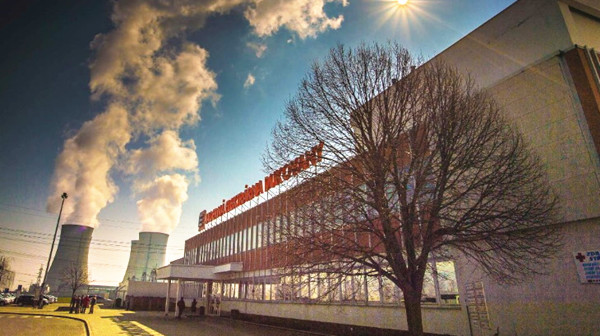The Czech government has agreed the next steps towards investment in a new nuclear power plant and given Deputy Prime Minister Karel Havlíček a mandate for talks on the project with the European Commission.

The Dukovany nuclear power plant (Image: ČEZ)
Czech utility ČEZ applied to the State Office for Nuclear Safety on 25 March to construct two new reactors at its Dukovany nuclear power plant. Four VVER-440 units are currently in operation at the site, in Vysočina Region.
"After today's meeting of the government, the mutual relations between the state and the investor in the new nuclear power unit are clear, which is to replace the existing power plant in Dukovany after 60 years of operation," the Czech Ministry of Industry & Trade said in a statement yesterday. "The government and ČEZ will sign agreements on the project in the middle of this year and a tender to select a reactor supplier will be launched by year-end," it added.
The two agreements that the government will sign with ČEZ and its subsidiary Elektrárna Dukovany II cover the project's framework and its implementation. The first of these was prepared in the summer of last year and covers cooperation and construction "from tender to operation", the ministry said. The second concerns cooperation in the construction of a new nuclear power plant at Dukovany. "The state needs the certainty that everything will be completed on schedule, regardless of external conditions. The contracts, which are to be submitted to the government for approval by 30 June, provide for this," it said.
"We must be energy self-sufficient, while also addressing the decline in coal and the European Union's requirements for carbon neutrality. Even the current situation around coronavirus shows that the issues of self-sufficiency and safety are primarily ours; we must rely mainly on ourselves. That is why we need new nuclear resources; that is why we are currently working with Dukovany II," Havlíček said in the ministry's statement.
"Our energy experts are in daily contact with the construction investor - ČEZ. By no means does this mean that the state will bear the business risks or additional costs for poor management of the construction project. We need clear guarantees. That is why, among other things, a new law on the transition to low-carbon energy is being created; that is, contracts that give the state control over every major decision related to new nuclear resources," he added.
ČEZ is required to present a financing model for the new units by 31 May and the Ministry has been tasked with submitting a bill on low-carbon energy transition legislation to the government by 30 June.
ČEZ CEO Daniel Beneš said the supplier for the project would be selected by the end of 2022, and that detailed contractual documentation would then be negotiated, including confirmation of the supply chain. By 2024, contracts will be signed and further steps will be taken, such as securing a site permit, he added.
Researched and written by World Nuclear News